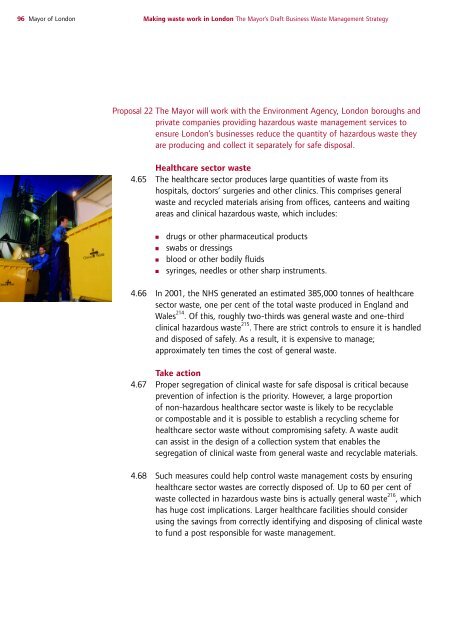Draft Business Waste Strategy PDF - london.gov.uk - Greater ...
Draft Business Waste Strategy PDF - london.gov.uk - Greater ...
Draft Business Waste Strategy PDF - london.gov.uk - Greater ...
You also want an ePaper? Increase the reach of your titles
YUMPU automatically turns print PDFs into web optimized ePapers that Google loves.
96 Mayor of London<br />
Making waste work in London The Mayor’s <strong>Draft</strong> <strong>Business</strong> <strong>Waste</strong> Management <strong>Strategy</strong><br />
Proposal 22 The Mayor will work with the Environment Agency, London boroughs and<br />
private companies providing hazardous waste management services to<br />
ensure London’s businesses reduce the quantity of hazardous waste they<br />
are producing and collect it separately for safe disposal.<br />
Healthcare sector waste<br />
4.65 The healthcare sector produces large quantities of waste from its<br />
hospitals, doctors’ surgeries and other clinics. This comprises general<br />
waste and recycled materials arising from offices, canteens and waiting<br />
areas and clinical hazardous waste, which includes:<br />
■ drugs or other pharmaceutical products<br />
■ swabs or dressings<br />
■ blood or other bodily fluids<br />
■ syringes, needles or other sharp instruments.<br />
4.66 In 2001, the NHS generated an estimated 385,000 tonnes of healthcare<br />
sector waste, one per cent of the total waste produced in England and<br />
Wales 214 . Of this, roughly two-thirds was general waste and one-third<br />
clinical hazardous waste 215 . There are strict controls to ensure it is handled<br />
and disposed of safely. As a result, it is expensive to manage;<br />
approximately ten times the cost of general waste.<br />
Take action<br />
4.67 Proper segregation of clinical waste for safe disposal is critical because<br />
prevention of infection is the priority. However, a large proportion<br />
of non-hazardous healthcare sector waste is likely to be recyclable<br />
or compostable and it is possible to establish a recycling scheme for<br />
healthcare sector waste without compromising safety. A waste audit<br />
can assist in the design of a collection system that enables the<br />
segregation of clinical waste from general waste and recyclable materials.<br />
4.68 Such measures could help control waste management costs by ensuring<br />
healthcare sector wastes are correctly disposed of. Up to 60 per cent of<br />
waste collected in hazardous waste bins is actually general waste 216 , which<br />
has huge cost implications. Larger healthcare facilities should consider<br />
using the savings from correctly identifying and disposing of clinical waste<br />
to fund a post responsible for waste management.
















